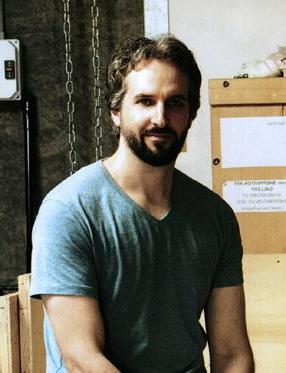
2 minute read
In the Studio: Sam Jinks
CAN YOU DESCRIBE YOUR STUDIO? IS THERE ANYTHING ARCHITECTURALLY SPECIAL ABOUT IT?
SJ/ The studio is a double storey warehouse building, with a large roller door and concrete floor downstairs and a carpeted clean area upstairs. Downstairs is where I make a mess - sculpt, make molds, paint, etc. There are a few different benches with work at various stages, there are plenty of tools and machines, a fume cupboard, some plants, my beloved Cutler roll top desk and a kitchen area. Upstairs is where I do admin, sketching, hair punching, 3D scanning and printing. I also have a lot of maquettes upstairs, and also a couch for naps. It’s very peaceful up there, unless the kids are visiting, and then it’s noisy and covered in crumbs!
DO YOU HAVE ASSISTANTS? IS THERE ROOM FOR EVERYONE? DO YOU PREFER WORKING ON YOUR OWN OR WITH OTHERS?
SJ/ I prefer to work alone, but occasionally I need to get someone in to help. I like to make sure everyone has their own personal space, so we’re not working on the same thing side by side.
Lately I’ve been able to work with some great technicians who have their own studio space, so they can take some work there to finish.

Sam Jinks working on Iris - the messenger, 2018 in his studio
YOU WORK WITH A LOT OF CHEMICALS – HAS THIS EVER HAMPERED YOUR HEALTH?
SJ/ Many of the materials I use are quite benign, silicone for example, but I’ve always been very careful with solvents. I built a fume cupboard for mixing noxious materials, I also use it when I’m painting, as aerosolised particles are very small. I also use a Sundstrom mask and filter. Clay dust can also be dangerous, as its easily inhaled and can lead to silicosis.
YOUR WORKS TAKE A LONG TIME TO MAKE, FROM CONCEPT TO THE PERFECT FINISHED DETAILS. WHICH IS THE MOST ENJOYABLE PART OF CREATION? AND WHICH IS THE MOST DIFFICULT?
SJ/ The sculpting stage is my favourite, capturing the form of the work in monochromatic grey clay. It’s very painstaking, I often re-sculpt parts many times to get them right, and if it’s winter, the clay can be very hard and difficult to work with. As for the most difficult part, the painting is very tedious, as I’m stuck in the fume cupboard wearing a mask, so it’s also quite taxing. Rigging and finishing work is a pain, there’s a lot of unknowns to solve, a lot of wrestling on the floor trying to get everything together.
DOES YOUR RELATIONSHIP TO A WORK CHANGE AFTER IT IS FINISHED AND YOU SEE IT IN A MUSEUM?
SJ/ Of course, you never really get to see the work completed until it’s left the studio. You have to shut down your senses in a way to get it finished, and it’s a mad scramble to get it into the crate while the couriers are waiting.
In a museum or gallery, I still need to finesse a few details, the hair and lighting,W etc. But then to finally stand back, to see the way visitors react, is another life for the work, beyond my studio.









